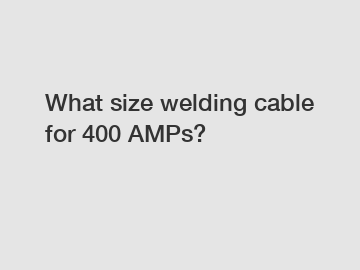What size welding cable for 400 AMPs?
What size welding cable is suitable for 400 AMPs?
If you find yourself in need of welding equipment for heavy-duty projects, it's crucial to understand the importance of selecting the right cable size. In welding applications, the cable carries the current from the welding machine to the welding tool itself. The correct size of welding cable depends on the level of amperage required for the task at hand. In this article, we will explore the factors to consider when determining the appropriate cable size for a 400 AMP welding application.
1. Ampacity and Cable Size:

The ampacity of a cable refers to its ability to carry an electrical current without overheating. Ampacity is influenced by several factors, including the conductor material, cable diameter, insulation, and surrounding environment. Choosing a welding cable with inadequate ampacity for a 400 AMP welding machine can lead to overheating, premature cable failure, and potential safety hazards.
2. Current Capacity and Voltage Drop:
When it comes to welding, maintaining an adequate voltage supply is paramount. Voltage drop occurs when the cable length is not appropriately matched to the amperage and causes a decrease in voltage at the welding tool. Selecting the right size welding cable helps minimize voltage drop, ensuring that the welding machine operates efficiently. A cable with inadequate thickness may result in excessive voltage drop, leading to inconsistent welding performance and potential damage to the equipment.
3. Choosing the Correct AWG:
American Wire Gauge (AWG) is a standard system used to measure the size of electrical conductors, including welding cables. The AWG number indicates the cable's cross-sectional area, with lower numbers representing larger cable sizes. For a 400 AMP welding application, experts recommend using a cable with an AWG rating of 3/0 (000) or 4/0 (0000). These sizes offer sufficient ampacity and minimize voltage drop.
4. Flexibility and Cable Length:
While considering the ampacity and AWG rating, it's also important to contemplate the cable length and its impact on flexibility. Longer cables require larger conductor sizes to compensate for the voltage drop over the length. However, thicker cables can be less flexible and more challenging to maneuver, making it crucial to strike the right balance between cable length, thickness, and ease of use. In general, shorter cable lengths are preferred when working with high amperage applications.
In conclusion, choosing the appropriate welding cable size for a 400 AMP welding machine is key to maintaining the equipment's performance and ensuring safety during welding operations. In this context, selecting a cable with the right ampacity, correct AWG size (such as 3/0 or 4/0), and considering the cable length and flexibility requirements are crucial factors. By investing in the correct cable size, welders can optimize their work, reduce potential risks, and ensure the welding machine operates at its full potential, delivering high-quality welds consistently. So, next time you embark on a heavy-duty welding project, don't overlook the significance of selecting the right size welding cable – it's a small yet critical aspect that can make a significant difference in your welding endeavors.
For more information, please visit h03rn-f rubber cable, flat marine cable submersible cable factory, 26/35kv steel wire armored cable suppliers.
269
0
0

Comments
All Comments (0)